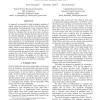Free Online Productivity Tools
i2Speak
i2Symbol
i2OCR
iTex2Img
iWeb2Print
iWeb2Shot
i2Type
iPdf2Split
iPdf2Merge
i2Bopomofo
i2Arabic
i2Style
i2Image
i2PDF
iLatex2Rtf
Sci2ools
121
click to vote
FPL
2008
Springer
2008
Springer
High-speed regular expression matching engine using multi-character NFA
An approach is presented for high throughput matching of regular expressions (regexes) by first converting them into corresponding Non-deterministic Finite Automata (NFAs) which are then configured onto a FPGA. The key novel feature is a technique that, for any given regex, constructs an NFA that processes multiple characters per clock cycle. An efficient algorithm is proposed that outputs an NFA which processes twice the number of characters as the input one. A technique is also proposed that implements the range match operation (e.g. [a-z]) efficiently. A program has been written that implements above ideas to convert regexes into NFAs specified in a structural Hardware Design Language (HDL), which are then mapped onto a FPGA. Performance is evaluated using real world regexes (Snort ruleset). The results demonstrate the practical utility of the approach. For example, for a set of 2,691 regexes, while the standard 1
| Added | 26 Oct 2010 |
| Updated | 26 Oct 2010 |
| Type | Conference |
| Year | 2008 |
| Where | FPL |
| Authors | Norio Yamagaki, Reetinder P. S. Sidhu, Satoshi Kamiya |
Comments (0)

